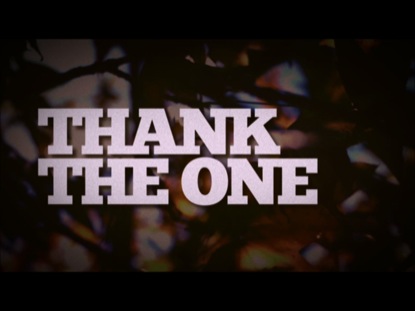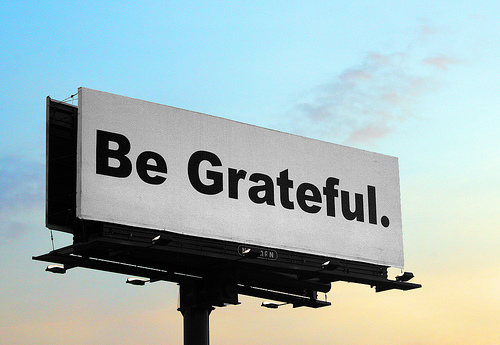I was having a lightning-fast lunch on the grass of Wheaton College’s quad last week when a friend reminded me about gratitude. It was a timely knock upside the head, as I’ve allowed the decisions I’m having to make these days to rob me of both serenity and sleep, and the gratitude that has so often shifted my attitude has taken a back-seat to self-doubt, restlessness and outright fear.
My friend’s encouragement actually reminded me of a post I wrote four years ago, in which I mostly covered what gratitude isn’t.
I received a note from Allyn, that year, a reader who had noticed the rather heavy-handed emphasis I put on gratitude. With her permission, I’d like to pass on a portion of her email:
“I want to be like you…to be thankful. But my husband of 9 years just left me, mostly because of MK stuff I’m still dragging around. His parting shot was threatening to get custody of our two kids, so I’m not doing too well at being thankful for this situation…”
Shortly after my cancer diagnosis in the summer of 2008, my mom printed out an article by a well-known Christian writer who went through a battle against prostate cancer. He suggested several steps for cancer fighters, one of which was being grateful for the disease. I respect this man’s writing tremendously and the impact he’s had on the Christian world, but I vehemently disagree with his statement about gratitude. And I hope—truly hope—that I haven’t inadvertently repeated it by being too vague in my writing on the subject.
When I write of gratitude, it isn’t in the sense that I am grateful for the disappointments, challenges and tragedies of my life. I can no more be grateful for my cancer than Allyn can be for her divorce or victims of Japan’s tsunami for their trauma. Implying that God expects us, as believers, to be grateful FOR THE PAIN in our lives, in my opinion, would border on blasphemy. It would be akin to counseling a rape victim to be thankful for her attack or a molested child for his/her aggressor’s actions.
No—I believe that (with God’s indispensable help) we can be thankful IN SPITE OF OUR PAIN. Not for it. But that gratitude sometimes will have to wait until a certain amount of healing has had time to occur. My life has been, from earliest childhood, a collage of injuries and assaults that happened on the deepest of levels. The wounds were undeserved and unvindicated, and the resulting scars were jagged and crippling. Looking back on the child I was, I can’t fathom telling her to “buck up and be thankful.” In the fog of depression that plagued me from my youngest age until my mid-twenties, I didn’t possess the wherewithal to be optimistic or forward-looking—I was trapped in a miasma of so much helplessness and hopelessness that I was incapable of any form of genuine joy.
It took healing to bring me to the point where I could look beyond the pain and find reasons to be grateful in spite of it. So my response to Allyn when she wrote was not to try harder. It was to seek healing first—to seek it assiduously and relentlessly, which often requires wading through the pain for a while. The problem is that the church tends to judge those who aren’t capable of being grateful. We need to promote healing, not layer shame on top of woundedness. But we’re not very good at that yet.
Am I grateful for the various traumas of my youth? How can I be? They handicapped and bound me and very nearly robbed me of my life. I would never—never—suggest that God wanted me to suffer as I did, which means He isn’t the person to “thank” for that pain either. It wasn’t His doing. He didn’t sit on His throne, point a finger at the frail child that I was, and say, “Let me see… I think this handful of horrible things will teach her a couple of important lessons.” It might be a question of semantics and it may be a question of theology, but I cannot believe that the God who said “Let the little children come unto me” would afflict them with mortal diseases and attacks on their innocence. There’s no denying we live in a fallen world where terrible things happen, and I haven’t been spared from that–none of us are.
What I do know and what I do praise God for is that He saw my pain before it even happened (indeed, He felt it!) and because of His redemptive goodness set in motion the influences and realizations that would allow some good to come from the horror. It is for that good that I am grateful—because that wounded child can now recognize the walking-wounded and minister to them, because of the healing that gave my scars purpose, because of the joy that thumbs its nose at evil’s best attempts to permanently damage me…
If I have at any point implied in my writing that we must all thank God for the devastation that ravages our lives, I apologize. Sometimes the best we can do is trudge through the pain with our eyes on a God who weeps with us –and with the faith that we will eventually be able to see how He has carried us and blessed us IN SPITE OF the humanity-inflicted wounds from which we suffer.
—See related article, “Centered Affliction,” here.







michele
Comment by AH on Facebook: “Thanks for this. Just yesterday I was lamenting that I don’t know how to feel glad that I am going through something. This gives me a better, more realistic picture of God that I have shared with others but had forgotten for myself.”
michele
Comment by EA on Facebook: “Excellent…a subject that is so painful and so complicated theologically…”
michele
Comment by AS on Facebook: “Thanks for putting into words what was alphabet soup in my brain. It was very helpful to read and get another perspective on this.”
journalingjunkie13
Well said! Dotsy